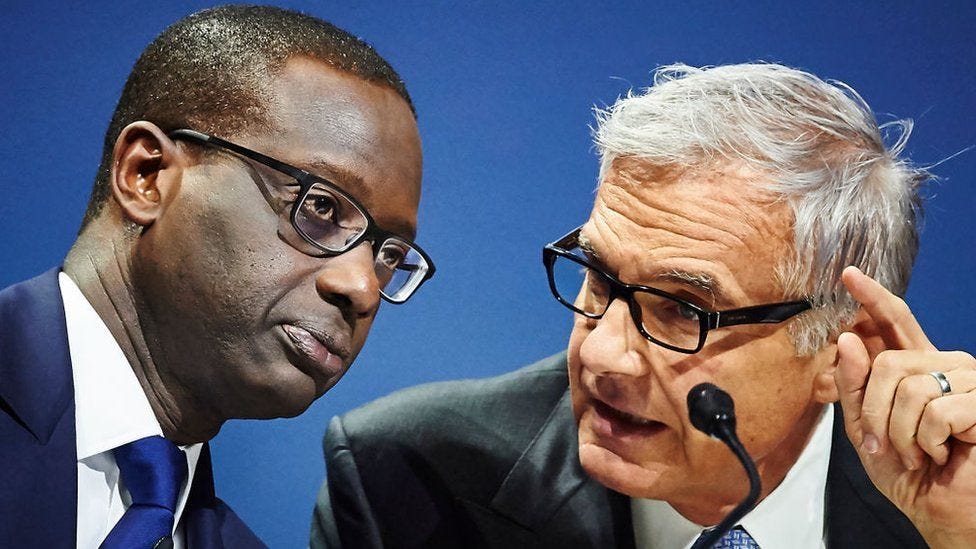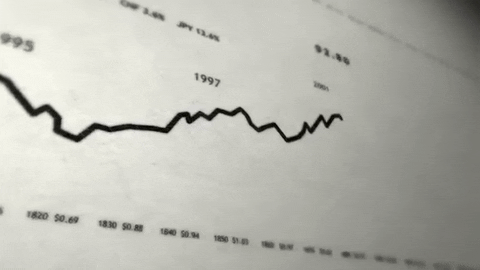
Dear Insider,
The Swiss do not like drama. Drama is bad. Drama is the opposite of strength and stability.
Drama is not Swiss.
Now the drama that has engulfed Credit Suisse over the past few months - spying scandal, personal spats among executives and boardroom wrestling matches - would seem to have come to an end.
CEO Thidjane Thiam is out.
But the run-up to this week’s dramatic conclusion as well as the immediate after-effects reveal a lot about how business is done in Switzerland.
And how it is not done.
We examine both sides of the coin this week - plus your usual dose of Inside information.
This is the Inside.
Ian
What to Expect
A brief run-down of what to look for in this week’s edition of The Swiss Insider:
Tiam’s (and Rohner’s) Seven Sins - what hidden lessons are there in the biggest news of the week: the abrupt (but not unexpected) departure of Credit Suisse CEO Thidjane Thiam…and his power struggle with Chairman Urs Rohner.
The Numbers Game - the most important (and at times audacious) numbers to be had in Swiss business over the last week. (Look for largeness…because size matters.)
The Briefing - snippets of news designed to make you smarter and keep you abreast of the latest developments across the wide Swiss business landscape.
Tiam’s (and Rohner’s) Seven Sins
The drama had been building for months.
(A reminder - the Swiss don’t like drama…).
After subtle and not-so-subtle exchanges between CEO Thidjane Thiam’s Instagram account, international investors and a wide range of commentators in the Swiss press, the final score has been announced - Thiam will leave, as of 14 February.
For context (and commentary), we recommend:
Behind Thiam’s Credit Suisse Execution - by Bloomberg
Credit Suisse Reels After Thiam Ouster - by Financial Times
Credit Suisse: the Pawn of Major Powers? - by Finews
But to analyse the situation on a more fundamental level - one that helps understand the overall business situation of Credit Suisse and Switzerland in general - we take a look at the Seven Sins of Thidjane Thiam and Urs Rohner - the two men at the center of the uproar.
Arrogance (Both)
Much has been made of Thidjane Thiam’s management style, one that reflected an autocratic manner borne and (likely) bred in the rarified halls of the Ecole Polytechnique in Paris. One reason few believed that Thiam had no knowledge of the spying done on Iqbal Khan (and apparently other top managers) was that the spying fit so well in the picture many had formed of the CEO when dealing with him.
But arrogance was not one-sided.
After Brady Dougan’s tenure as CEO of Credit Suisse, Chairman Urs Rohner apparently had enough of a top-notch investment banker looking down on him and his move to bring in Thiam belied his personal desire to have “his man” at the top.
Arrogance in believing that he could keep the upper hand with a non-banker CEO ultimately led to disaster. Yes, Thiam’s departure seems to justify Rohner, but the chairman’s “bold move” backfired spectacularly. It didn’t help that Rohner manoeuvred behind Thiam’s back to give Iqbal Khan an easy out.
Expectations (Rohner)
Chairman Rohner needed a turnaround man - and he got one in Thiam. As he expressed quite clearly after the fact, “one cannot simply replace a successful CEO.” The problem is, of course, that Rohner entertained unrealistic expectations in courting Thiam as his new CEO.
Would the turnaround, with its massive cuts and cold-hearted realignment, have worked with a less ruthless man at the top? Doubtful.
While the culture and internal morale of the bank suffered, Credit Suisse got the numbers it wanted - except for a sliding share price.
Ultimately, Rohner expected to have his cake and eat it too - and he was wrong.
Communication (Both)
Former communications executives from Credit Suisse are unanimous - the organisation’s comms teams are a mess. Looking at the handling of Khan-inspired Spygate, one can only agree.
But beyond the failed corporate communications team, both main actors in the drama deserve reprimands for their communication blunders.
Exhibit A: Rohner’s negotiation with Iqbal Khan, which let him slide across the city to UBS with only 3 months of garden leave.
Exhibit B: Thiam’s taking to Instagram to fire back at his perceived enemies in the Swiss press.
Predictable strategy (Thiam)
Was Thiam’s downfall all about character and detective deals? No.
At least part of the blame for the debacle on Paradeplatz can be traced to the turnaround strategy which he brought to the bank. As noted above, it produced results, for which no one can fault the chief executive. But it was predictable - and had predictably bad side effects.
Heavy job cuts (over 2 000) in the investment bank side of things, fueled bad blood among the pure-blood bankers who were suspicious of the ex-insurance executive to begin with. This was to be expected, for sure, as heavy write-offs shot holes in the banks profits before Thiam’s arrival, but the fact that it didn’t come with any carrot to balance out the stick was bad news in the long run.
A shift towards more revenues from wealth management followed the example of cross-town rival UBS. Copying from your competitor won’t make you a hero.
Playing to the press (Thiam)
As mentioned ealier, Thiam’s strategy of addressing his critics through Instagram proved to be an ill-fated move. Not only did it lose him respect among the high-and-mighty of his banking peers, it cast him as desperate to local reporters.
But the outspoken opinions of major shareholders, Harris Associates and others didn’t help either. Of course, Thiam could claim he had nothing to do with those messages of support from across the Atlantic. To embrace them openly would have been to invite all-out war, making any hope of staying on and calming the storm untenable.
But the very style of proxy-warfare was just as damaging. It belied a lack of openness and directness, which no journalist could rightfully respect.
Playing to the press (Rohner)
Rohner’s role in using (subtly) the press to his advantage deserves a separate point in this list. While he was clearly not the same star in the media as Thiam and did not play the role of international spokesman for the bank, he leveraged the hometown media very much to his advantage.
Even as he moved swiftly to react to the initial reports of spying on Khan, Rohner moved much slower when follow-up reports surfaced. As FINMA stepped out into the open to declare its intention to launch an investigation, the local media began to do Rohner’s job for him, stepping up the pressure on Thiam.
Ironically, the strong calls for Rohner’s resignation from Harris and others proved to be the rallying cry which helped line up board support for a CEO change.
Swiss strategy (Thiam)
At the end of the day, Thiam underestimated the strength and willpower of the Swiss elements within Credit Suisse. His star power, his international connections and his success among the rich and powerful may have helped shift the bank’s focus to wealth management and add a certain lustre to the loss-making bank as it returned to profitability. But it wasn’t the Swiss way.
While he felt comfortable among the many visitors crowding into Davos from around the world, Thiam lacked a way to truly connect with the home market and the discretion to play the Swiss banker role as necessary on Swiss soil.
His Swiss strategy failed - or worse…he never had one.
Happy to be Inside?
Share what you now know…
The Numbers Game

In which we serve up some of the more interesting numbers in Swiss business…
12 000 CHF
By living in Schaffhausen, near the Swiss-German border, and working in Zurich, a renter with a 3,5 room apartment could potentially save 12 000 CHF per year. Not bad, considering that the train commute is as regular as a Swiss watch…
11 000
When top? For the Swiss, who are used to heights, the rapid rise of the SMI is astounding indeed. This past week it broke through the 11 000 mark - a new all-time high. So what if there are negative interest rates, right?
10,22 %
Since its inception in 1948, only once has the AHV pension system seen a higher yearly return than in 2019. With a return of 10,22%, the Compenwiss fond has a new (almost) record. Only possible throught the epic equities rally, the AHV system is still deeply flawed and hardly supportable.
184 million CHF
Who says that the Swiss can’t make music? (No one…except the judges and fans of Euro Vision, apparently. Although the 2019 edition was an exception…) The numbers point to a strong industry which saw growth of 7,5% to reach 184 million CHF in revenue. The sad thing is: artists will see little to none of the new riches.
300
No more free lunch at Julius Baer. In fact, no more nothing for more than 300 employees, if CEO Philipp Rickenbacker has his way. The new top man announced a strategic plan that includes heavy cuts of 300 front-line staff. Their replacements will come with the next strategic growth plan, whenever that comes…
Want more?
Follow The Swiss Insider on Twitter for bite-size news as it happens - from Inside. #insidersdoitsmarter

The Briefing
In which we digest business news from around Switzerland - bit by bit…
Dumping down
The dirty little secret of business is the same everywhere - buy low, sell high. The same applies to people as well, apparently - except in the case of Epislon, the subsidiary of the Geneva Post Office. After being caught refusing to pay its 60+ full-time employees the industry standard wage, the company will have to pony up 180 000 CHF in fines. Time to quit wishing for robots… (Read the story here.)
Record-breaking margins
While Roche and Novartis bask in the limelight of the Swiss pharma industry, it is their less well-known chemical company Ems Group, which has them beat on margins. The manufacturer, whose main target group includes the automotive industry, regularly enjoys margins of 29% and up. Its secrets to success are simple… (Get the insights here.)
No new targets
As the new year rolls on, the news is not good for Swiss banks, especially of the private variety. The big clue? Both UBS and Julius Baer have acknowledged that they will no longer use “net new money” as a key target for their wealth units. Pictet would have done well by this metric - but its hiring spree saw profits drop overall by 10%. “Growth at all costs” seems to be the mantra of the past now… (Read the analysis here.)





